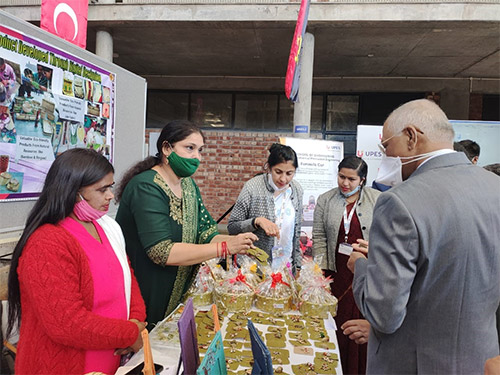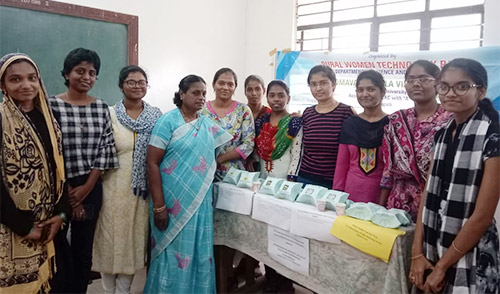 Dr.Neelu Ahuja, a Professor in Computer Science Department, of Petroleum and Energy Studies (UPES), Dehradun is passionate about initiatives that would change lives of rural women and other marginalized sections of the society. She is confident that science and technology could play a vital role in income generation of rural women of Uttarakhand, a state for which she has grown a deep attachment through her 20 years of professional life in it.
Dr.Neelu Ahuja, a Professor in Computer Science Department, of Petroleum and Energy Studies (UPES), Dehradun is passionate about initiatives that would change lives of rural women and other marginalized sections of the society. She is confident that science and technology could play a vital role in income generation of rural women of Uttarakhand, a state for which she has grown a deep attachment through her 20 years of professional life in it.
Having knocked on many a door to realize her dreams, she chanced upon the Women Technology Park (WTP) programme under Science & Technology for Women Scheme of the Department of Science & Technology, Government of India. Through this scheme she has been able to change the lives of 280 rural women of Dehradun by training them into skills to earn their livelihood by producing and selling various special items. They are the most enterprising among the 480 women trained under the project. Through the technological training, the women were able to utilize locally available natural resources like bamboo, jute, date palm leaves into jewelry items and decorative pieces. They also turned waste to wealth by making pencils out of newspaper and acquired the skill to cultivate medicinal plants.
“Regular earning has made them confident and now they want to explore more ways to increase their earning,” said Dr. Ahuja.
Far away in Andhra Pradesh another WTP has trained around 350 rural women to develop products ranging from herbal to food and cosmetics. Dr A Jyothi, a retired Professor from Sri Padmavati Mahila Visvavidyalam, Tirupati who was part of the WTP team elaborated on how the team conducted door-to-door survey to find out enterprising rural women and also school and college going girls in the various districts of the state who could be trained to improve their knowledge, skills and earn more using science and technology.
“We have developed 30 products which include food items and cosmetics and trained women through exhibition-cum-training programme. Most of them are doing well and earning by making and selling various products,” said Dr A. Jyothi.
Women Technology Parks are established in rural and peri-urban areas as technology modulation, adaptation and training Centers for women groups mainly from farming community. They promote development and adaptation of appropriate technologies, transfer proven technologies and demonstration of live technology models to improve the weakest link of the predominant livelihood system of women in an area and promote social entrepreneurship and women employment based on the strongest link of the livelihood system. They create an environment, where scientists and technologists from mentoring organizations could provide knowledge and appropriate technology for adoption and practice by women groups at their own farm or work place.
Some of the innovative technologies that women have been trained are operating shredder machine and usage of selective e-waste parts for remanufacturing, CNC hotwire cutter, vacuum-drying flowers and 3D chocolate printing machine. Also knowledge and training are being provided in processing perishable raw materials like crop, fruit and vegetable, milk, meat, egg, and fish into marketable value added products like virgin coconut oil, natural coconut vinegar, coir mat, herbal cosmetics, fruit and vegetable preserves clean milk, mozzarella cheese, milk beverages, meat and fish snacks, etc. at small scale. Such technology-based value addition not only increases the income from the sale but also enhances the shelf-life and functionality of the products.
 Women receiving training through these WTPs can form Self Help Groups and set up their own micro enterprises to become self-reliant. WTPs also facilitate rural women in ensuring the marketability of their produces by providing backward linkage to financing institutions like NABARD, District lead banks etc. and forward linkage to District authorities, village panchayat and other government schemes viz. State Rural Livelihood Mission.
Women receiving training through these WTPs can form Self Help Groups and set up their own micro enterprises to become self-reliant. WTPs also facilitate rural women in ensuring the marketability of their produces by providing backward linkage to financing institutions like NABARD, District lead banks etc. and forward linkage to District authorities, village panchayat and other government schemes viz. State Rural Livelihood Mission.
The value of WTP programme in Women Empowerment through Science and Technology have been appreciated recently by the parliamentary committee for women empowerment in its report “The Committee believe that Women Technology Park (WTP) set up with the help of government agencies would be a boon for the rural poor. Demonstration of feasible projects and transfer of proven technologies to the society would improve the livelihood and quality of life of rural women by imparting necessary entrepreneurial skills”.
Around 10,000 rural women have benefitted from this scheme in the last five years. So far 28 WTPs have been completed successfully and some of them are sustaining themselves and 12 Parks are still ongoing in various parts of the country. With more such Parks being planned in future, the WTPs can play a yeomen role in creating Atma Nirbhar Bharat at community level.






























